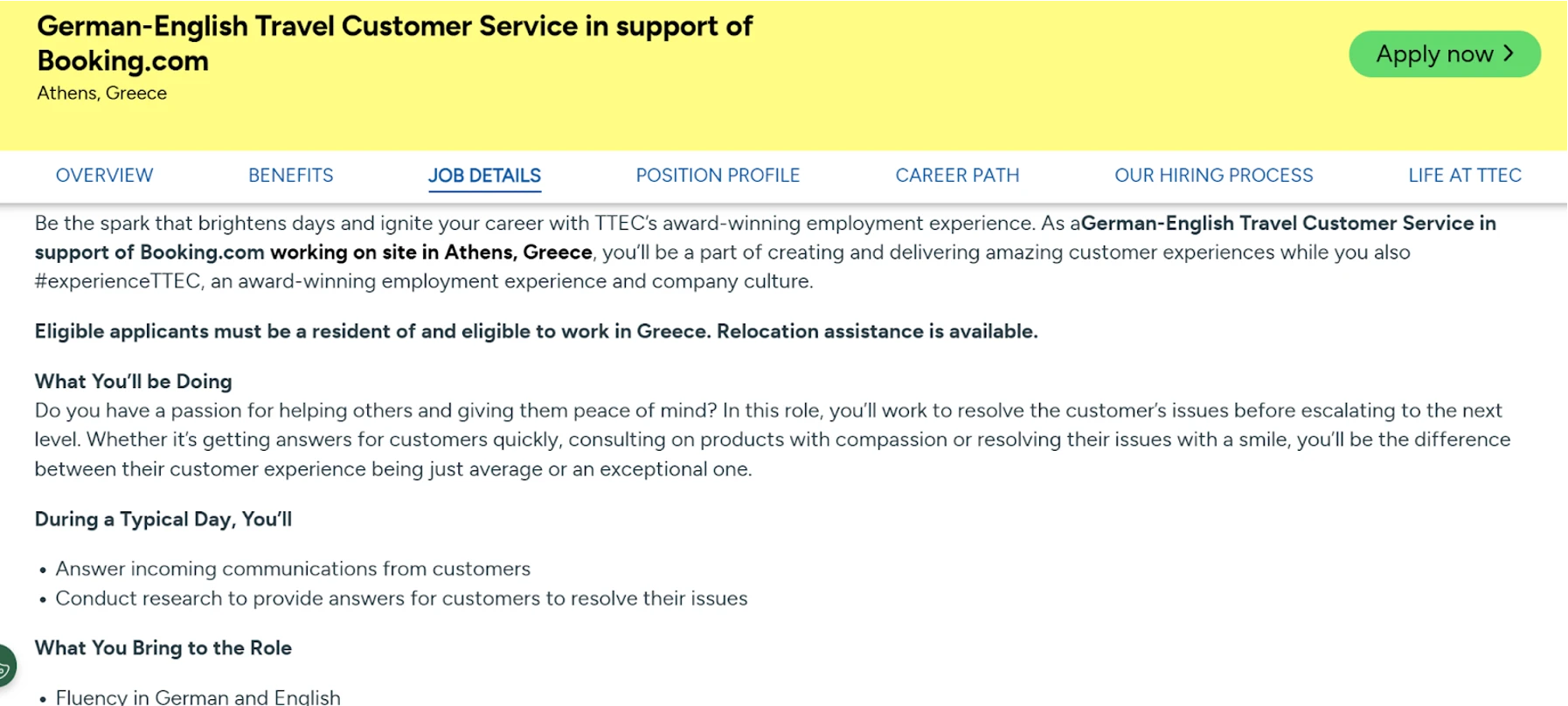Customer Success vs Customer Support: Which Job's Right for You?

04/03/2025
Key Takeaways
- Customer success focuses on proactive strategies to help clients achieve their goals with a product or service.
- Customer support deals with immediate issues and questions, aiming to resolve them efficiently.
- Both roles require strong communication skills, but customer success also demands strategic thinking.
- Choosing between these roles depends on your personal strengths and career aspirations.
- TTEC offers the best opportunities in customer success and customer support roles to level up your desired career path.
Customer Success vs Customer Support Overview
Customer success involves anticipating customer needs, ensuring they get the most out of a product or service, and driving long-term value for both the customer and the company.
It's a forward-thinking position that focuses on the bigger picture.
Whereas, customer support involves addressing customer inquiries, troubleshooting issues, and providing solutions promptly.
Customer support is the frontline of customer service, dealing with immediate problems and ensuring customer satisfaction.
Role Importance
Customer success managers (CSMs) work closely with clients to understand their objectives and help them achieve success using the company's products.
They are often seen as trusted advisors, guiding customers through their journey and ensuring they realize the value of their investment.
Customer support agents, meanwhile, are the heroes who step in when things go wrong. They are experts at problem-solving and are equipped to handle a wide range of issues, from technical glitches to billing inquiries. Their goal is to resolve problems efficiently and maintain a positive customer experience.
Career Impact and Growth
Customer success roles are often seen as more strategic, with opportunities for growth into management or account management positions.
Because these roles focus on long-term relationships and business outcomes, they can lead to significant career advancement.
Customer support roles, while critical, often have a more defined career path. Many support agents move into specialized roles, such as technical support or quality assurance.
However, the skills developed in customer support, like communication and problem-solving, are highly transferable and can open doors to other areas within a company.
Join TTEC: A Global Leader in Customer & Employee Experience
TTEC, a customer experience innovator, operates across 6 continents in countries such as Greece, Poland, and India, and employs over 55,000 individuals fluent in 50 languages. Our commitment to excellence is evident in our award-winning culture, highlighted by our 2024 accolades like Top 10 Operations Teams, Silver Certification in MLT’s Black Equity Program, and recognition as one of the UK’s Best Workplaces.
With an employee satisfaction rating of 4.1 out of 5 on JobStreet, we pride ourselves on creating supportive and flexible work environments that enhance both employee and customer experiences. Find a variety of client-facing and business support roles within a company that values community connections.
Find Your TTEC SparkDaily Responsibilities
Customer Success Tasks
- Conducting regular check-ins with clients to discuss their goals and progress
- Developing customized plans to help clients achieve their objectives
- Identifying opportunities for upselling or cross-selling additional products or services
- Collaborating with other departments to ensure a seamless customer experience
Customer Support Duties
- Answering customer inquiries via phone, email, or chat
- Troubleshooting technical problems and providing solutions
- Escalating complex issues to higher-level support or technical teams
- Documenting customer interactions and solutions for future reference

Essential Skills for Success Roles
As a customer success manager, you need to understand your client's business goals and develop strategies that align with those objectives. This means being able to see the bigger picture and anticipate future needs.
Another key soft skill is relationship-building. Success managers must build strong relationships with clients, which involves excellent communication and interpersonal skills.

Key Skills for Support Roles
First and foremost, excellent communication skills are a must. Support agents need to convey information clearly and effectively, whether it's through phone, email, or chat.
This includes being able to explain technical details in a way that's easy for customers to understand.
Patience and empathy are also critical skills for support roles. Customers often reach out when they're frustrated or upset, so being able to remain calm and empathetic can help diffuse tense situations.
Technical proficiency is another important hard skill for support agents, especially if you're working in a tech-related field.
You need to understand the product or service inside and out to troubleshoot issues effectively. Also, time management is crucial, as you'll often juggle multiple customer inquiries simultaneously.
Work Environment
Team Structure in Customer Success
Customer success roles often involve more flexibility and autonomy. Success managers typically have the freedom to manage their schedules and prioritize tasks based on client needs (e.g., traveling to meet with clients in person).
- Collaborative environment where success managers work closely with sales and marketing teams
- Frequent cross-departmental meetings to align on client strategies
- Regular brainstorming sessions to develop innovative solutions for clients
Customer Support Environment
Customer support roles tend to be more structured, with set shifts and defined processes. This can be ideal if you prefer a more predictable work schedule and enjoy having clear guidelines to follow.
- Structured environment with defined processes and protocols
- Opportunities to specialize in specific areas, such as technical support or billing inquiries or even travel and hospitality
- Regular training sessions to stay updated on product changes and new features.
Performance Metrics
Success Metrics
In customer success, metrics focus on long-term outcomes and customer satisfaction. Some common success metrics include:
- Customer retention rate: Measures how well you retain customers over time
- Net Promoter Score (NPS): Gauges customer loyalty and satisfaction
- Customer lifetime value (CLV): Calculates the total revenue a customer generates over their relationship with the company

Support Metrics
Customer support metrics focus on efficiency and resolution. Some key support metrics include:
- First response time: Measures how quickly support agents respond to customer inquiries.
- Resolution time: Tracks how long it takes to resolve customer issues.
- Customer satisfaction score (CSAT): Assesses customer satisfaction with the support experience.
Choosing the Right Path
Consider the following factors when making your decision between being a customer success or customer support agent:
- Do you prefer a proactive, strategic role or a reactive, problem-solving role?
- Are you more comfortable working in a flexible, autonomous environment or a structured, process-driven one?
- What skills do you enjoy using the most, and which ones do you want to develop further?
- What are your long-term career aspirations, and how do these roles align with them?
Personal Preferences and Strengths
If you thrive on building relationships and enjoy strategizing for long-term success, customer success might be your calling. This role requires a proactive mindset, where you're constantly thinking ahead and anticipating customer needs.
But, if you find satisfaction in solving immediate problems and enjoy the challenge of quick thinking, customer support could be the perfect fit. It is ideal for those who excel in communication and can remain calm under pressure, providing solutions efficiently and effectively.
Long-term Career Goals
Customer success roles often lead to opportunities in management and strategy, providing a path to significant career advancement.
The skills developed in this role, such as strategic planning and relationship management, are highly valued in many industries.
Customer support roles, while more defined, provide the opportunity to specialize in areas like technical support or quality assurance.
These roles can also serve as a stepping stone to other opportunities within a company, thanks to the transferable skills gained, such as communication and problem-solving.
Building Your Customer Experience Career at TTEC
Deciding between customer success and customer support really comes down to where your strengths shine brightest. Both paths help create amazing customer experiences, just in different ways.
At TTEC, we value both roles equally and have built awesome career paths for each! Whichever direction speaks to you, we've got the support system to help you succeed.
You'll grow through thousands of training courses, enjoy flexible schedules that actually respect your life outside work, and join a team where your voice truly matters. We believe in taking care of our people first - with comprehensive benefits, wellness programs, and a workplace culture that celebrates your achievements.

The best part? With our global presence and award-winning workplace culture, you're not just choosing between two career paths – you're joining a community where both are valued, supported and set up for serious growth.
Frequently Asked Questions (FAQ)
What is the main difference between customer success and support?
The primary difference lies in their approach: customer success is proactive, focusing on long-term relationships and strategic planning, while customer support is reactive, dealing with immediate issues and providing solutions.
Which role offers more career advancement opportunities?
Customer success roles often lead to significant career advancement due to their strategic nature and focus on long-term business outcomes. However, both roles offer opportunities for growth, depending on your career goals.
Can I switch from support to success roles?
Yes, transitioning from customer support to customer success is possible, especially if you develop the necessary skills and demonstrate a strong understanding of customer needs. Many professionals make this transition by using their experience in handling customer inquiries and problem-solving.
Is customer support only about handling complaints?
No, customer support is not just about handling complaints. While resolving issues is a significant part of the role, support agents also provide valuable information, assist with inquiries, and ensure customers have a positive experience with the company.
What makes TTEC different from other employers in the customer experience industry?
TTEC stands out by truly living our seven EVPs every day. Unlike other companies that just talk about culture, we've built a workplace where your growth is supported. Our recognition from Gartner to Stevie Awards proves we're serious about workplace excellence.
Join us and thrive
Your next opportunity starts here. Whether you're actively searching or simply exploring what’s next. our Talent Community connects you with opportunities that align with your goals.
